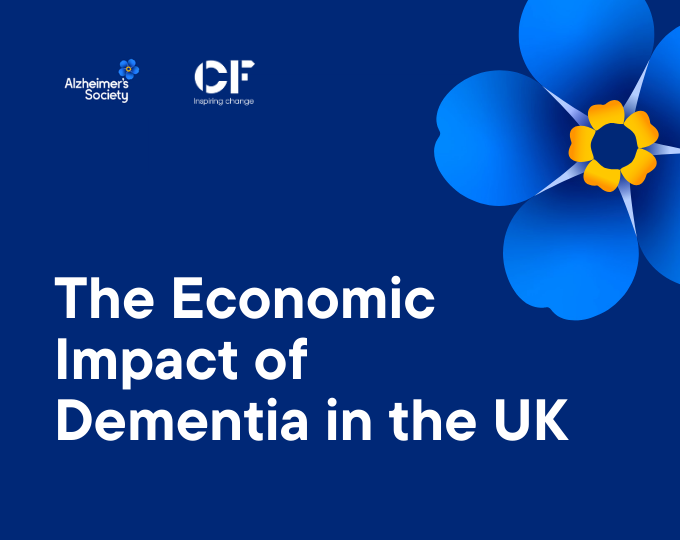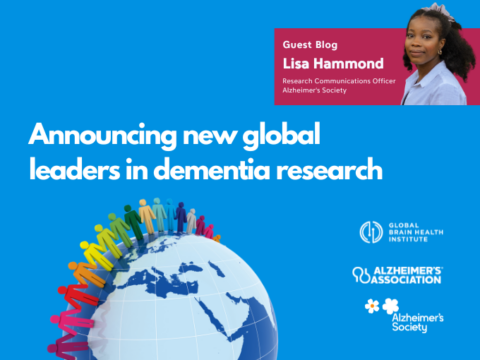
A new report commissioned by Alzheimer’s Society from Carnall Farrar sets out estimates of current and future economic and healthcare costs of dementia in the UK. It shows the huge impact that dementia has upon our health and social care system and how this will grow significantly in the future.
The projected rise in dementia prevalence poses a significant healthcare, social care and economic challenge, and highlights the urgent need to prioritise it as a health and care concern. There are currently estimated to be 982,000 people living with dementia in the UK, rising to 1.4 million in 2040.
The costs of dementia rise significantly as the condition progresses. The annual, per person cost for mild dementia is £28,700 compared to £80,500 for severe dementia, driven by increasing need for more complex health, social and unpaid care. If we can increase the time spent in earlier stages of dementia or decrease the length of time for which people require more complex care, the total costs of dementia could be reduced.
Despite strong evidence about the benefits of dementia diagnosis, spending on dementia diagnosis and treatment is equivalent to just 1.4% of total dementia healthcare costs.
An unacceptable amount of the financial burden of dementia is falling on individuals and families – 63% of the total cost of dementia is borne by patients and their families.
With increasing prevalence, the need for social care and unpaid care is set to increase by 43% by 2040. This is concerning – social care providers already find it challenging to recruit new staff, and the cost and time commitment of unpaid care is already significant with a third of unpaid dementia carers reporting that they spend more than 100 hours per week caring for a dementia patient.
the-annual-costs-of-dementiaDownload the full report
“One in three people born today will develop dementia. It’s the biggest health and care issue of our time, yet it isn’t the priority it should be amongst decision-makers. We wouldn’t accept this for any other terminal disease, we shouldn’t accept this for dementia. One in three people with dementia do not have a diagnosis. They are facing dementia alone without access the vital care, support, and treatments. If we don’t address diagnosis, we have no hope of addressing the major dementia challenges we face and reducing the cost to the health service and wider economy. Dementia’s devastating impact is colossal – on the lives of those it affects, on the healthcare system and on the economy. ” Kate Lee, Alzheimer’s Society CEO
How many people in the UK have dementia?
- There are currently estimated to be 982,000 people living with dementia in the UK.
- This is projected to rise to 1.4 million in 2040.
- This is due to an ageing population and population growth.
What are the costs of dementia?
- The cost of dementia in the UK is forecast to be £42 billion in 2024, rising to £90 billion by 2040.
- The total costs are made up of healthcare costs, social care costs, costs to unpaid care and quality of life and economic losses.
- Unpaid care is the largest driver of cost of dementia, at 50% of the total costs, followed by social care.
- Spending on dementia diagnosis and treatment is equivalent to just 1.4% of total dementia healthcare costs.
- The average per person costs associated with mild, moderate and severe dementia are estimated to be £28,700, £42900, and £80,500 respectively, with increase in cost by severity driven by increasing need of complex care.
What are the costs to families and people with dementia?
- A high percentage of the costs of dementia, estimated at 63%, are borne by patients and their families.
- By 2040, 43% more people are expected to receive unpaid care. A third of dementia carers report spending more than 100 hours a week in unpaid care.
- By 2040, 76,000 more people with dementia are projected to live in a residential home and 30,000 more in a nursing home. Already more than half of social care providers report challenges recruiting new staff.
- Nearly 50% of people fully fund their own residential and nursing care.
Background to the report
- This is one of the largest UK studies of healthcare resource utilisation by patients with dementia using a cohort of 26,097 dementia patients across Northwest London
- The study used a combination of modelling, expert opinion and healthcare records to identify real per person healthcare costs incurred.
- Patient level data across primary (e.g. GP surgies) and secondary care (e.g. acute hospitals), mental health and community and prescribing was used to identify real person healthcare costs.
- Costs associated with dementia beyond just health and social care such as quality of life and loss of economic consumption have been included
- The report includes an estimation of healthcare costs of undiagnosed patients compared to diagnosed patients by analysing two years’ worth of healthcare costs pre-diagnosis.
This article is shared from the Alzheimer’s Society website, find the original and more information and quotes on the report at https://www.alzheimers.org.uk/news/2024-05-10/soaring-dementia-care-costs-uk-42-billion

 Print This Post
Print This Post





